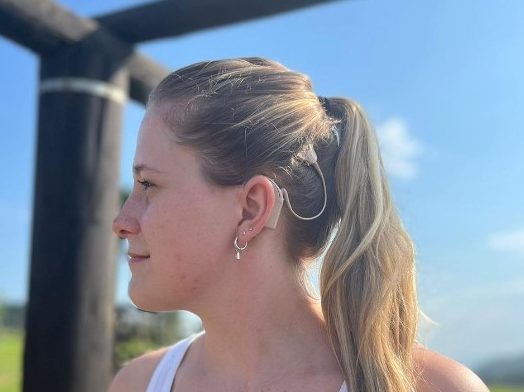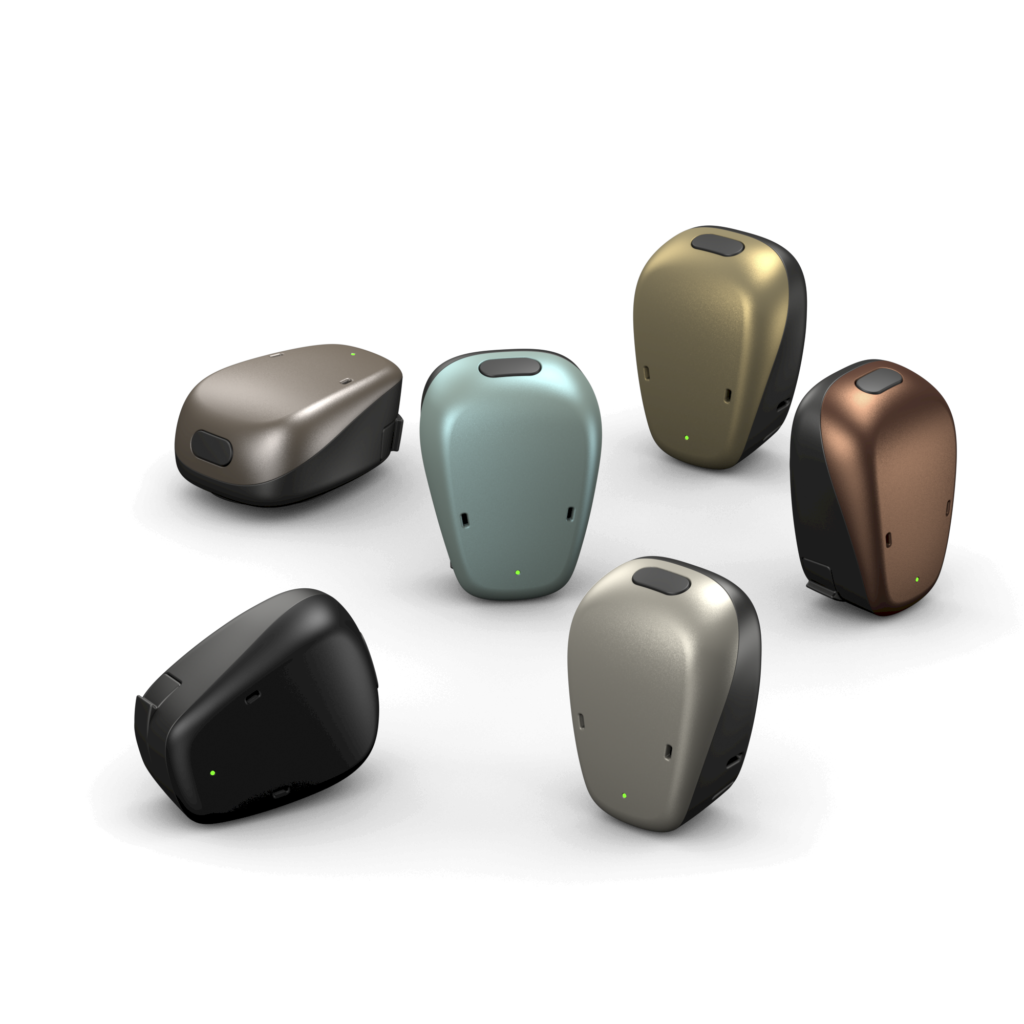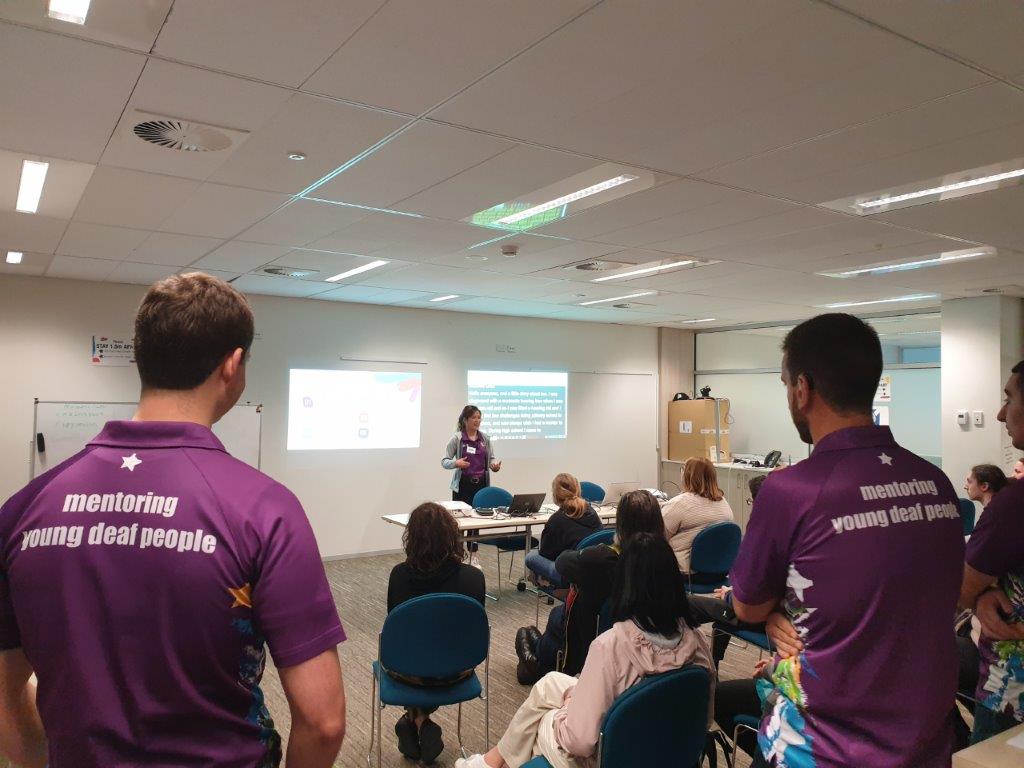Have you ever thought about upgrading but weren’t sure what’s involved or how to get started? Cochlear™ Volunteers answer the questions they are most asked regarding upgrades. As fellow cochlear implant recipients, their valuable insights and personal experience can really help you in your hearing journey.
Q. I’m happy with my current sound processor, why should I update it?
Whatever sound processor you’re using now, each release of a new sound processor brings a raft of improvements, such as hearing performance, direct streaming options, as well as smaller device size and many more.
As an example, here are some of the benefits of the latest Cochlear sound processors to consider:
- The Cochlear™ Nucleus® 8 Sound Processor is the world’s smallest and lightest sound processor.1 It’s 15% smaller than the Nucleus 7 Sound Processor^ and 32% smaller than the Nucleus 6 Sound Processor. ^^ The Nucleus Kanso® 2 Sound Processor is the smallest off-the-ear sound processor available. 2-3
- Both the Nucleus 8 and Kanso 2 sound processors feature hearing technology that automatically adjusts to help you hear in different listening situations. Nucleus 8 offers enhanced technology that senses changes in your listening environment and automatically adjusts to provide clearer sound. 4-7
- Many of our latest sound processors can stream audio from your compatible phone or tablet device for clearer sound. The Nucleus 8, Kanso 2 and Baha® 6 Max sound processors can stream from compatible Android™ and Apple devices. The Osia® 2 Sound Processor can stream from compatible Apple devices.*
- As well as streaming to compatible Apple and Android devices+, Nucleus 8 is ready for next-generation Bluetooth® LE Audio technology. Once it becomes available, you’ll be able to connect directly to more devices, such as Smart TVs and laptops. You’ll also be able to access broadcasts at public venues such as airports, conference centres and theatres supporting Bluetooth® AuracastTM. +
Q. How often can I upgrade?
This depends on how long you’ve had your current sound processor, the performance of your sound processor and your medical aid plan. If you’re paying for your new sound processor yourself, you can choose to upgrade when it suits you to take advantage of the benefits of the latest technology. Otherwise, ask your clinic for details about your upgrade options.
Q. How do I decide which sound processor to upgrade to?
If you have a Nucleus sound processor, you can choose between two different styles of device to best suit your lifestyle. Both offer the latest hearing technology. You can decide if you prefer the Nucleus 8 Sound Processor, worn comfortably behind the ear, or the Kanso 2 Sound Processor, which sits discreetly off the ear.
More about Nucleus 8 and Kanso 2 <<insert links>>
For those with older Baha sound processors, you can also upgrade to our latest device. The Baha 6 Max Sound Processor is a small, discreet, premium-power sound processor.
More about Baha 6 Max <<insert link>>
Q. Can I keep my existing sound processor if I upgrade?
Yes. If your older sound processor is still working, keep it in case you are ever off-air with your new sound processor. Check with your clinician if you have any questions.
Q. What will it cost?
This depends on various factors, like how long you’ve had your current sound processor and your medical aid plan. Our advice is that it’s always worth enquiring about the cost and payment options for your situation. After all, it costs nothing to ask, and it might cost you nothing to upgrade.
Q. Will a new upgraded device sound very different?
Your new sound processor may sound a bit different to your old device. With new technology comes improved hearing experiences, however, these may take some time to adjust to. Cochlear makes every effort to make this transition as smooth as possible, and your audiologist can also help.
Next steps
Were your questions answered? Would you like to learn more about what sound processors are available to you for upgrade, and how to get started? The Cochlear Services team will be happy to help answer all your questions and help you make an informed decision.
Understand your upgrade options<<Add local upgrade pages and contacts >>
References and disclaimers
- Cochlear Limited. D1190805 Processor Size Comparison. 2022, May.
- Cochlear Limited. CP950 Kanso Sound Processor User Guide. Data on file, July 2016.
- MED-EL. Rondo. The World’s First CI Single-Unit Processor. [PDFInternet] [as of August 2016]. Available from: https://s3.medel.com/pdf/US/fl-br/23710_21_RONDO+US+Factsheet.pdf.
- Cochlear Limited. D1864200 SCAN 2 Design Description. 2022, Apr.
- Mauger SJ, Warren C, Knight M, Goorevich M, Nel E. Clinical evaluation of the Nucleus 6 cochlear implant system: performance improvements with SmartSound iQ. International Journal Of Audiology. 2014, Aug; 53(8): 564-576. [Sponsored by Cochlear]
- Mauger S, Jones M, Nel E, Del Dot J. Clinical outcomes with the Kanso™ off-the-ear cochlear implant sound processor. International Journal Of Audiology. 2017, Jan 9; 1-10. [Sponsored by Cochlear]
- Wolfe J, Neumann S, Marsh M, Schafer E, Lianos L, Gilden J, O’Neill L, Arkis P, Menapace C, Nel E, Jones M. Benefits of Adaptive Signal Processing in a Commercially Available Cochlear Implant Sound Processor. Otol Neurotol. 2015 Aug; 36(7):1181-90. [Sponsored by Cochlear]
^Comparison made using the Compact Battery Module for Nucleus 8 Sound Processor and the Compact Rechargeable Battery for Nucleus 7 Sound Processor.
*For information regarding the compatibility of Cochlear’s Sound Processors with Apple or Android devices, visit www.cochlear.com/compatibility
+ As Bluetooth LE Audio compatible devices become available, a firmware update will be required for you to use certain features.



